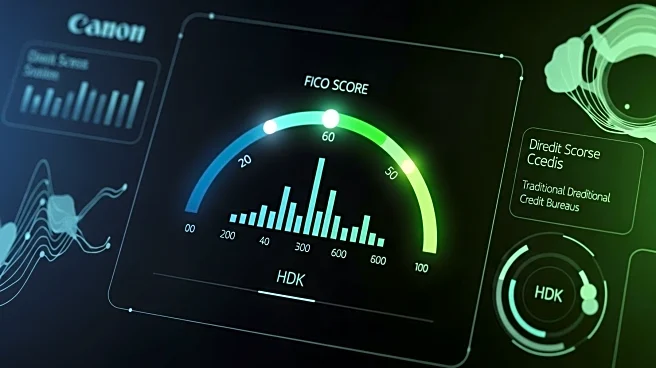What's Happening?
Fair Isaac Corporation (FICO) has announced a significant shift in the credit scoring industry by deciding to provide its FICO credit scores directly to firms that offer credit reports to mortgage lenders. This move is part of the FICO Direct Mortgage License Program, which allows tri-merge resellers—entities that consolidate data from major credit bureaus into a single report—to calculate and distribute FICO scores directly to customers. This development aims to eliminate the reliance on the three major nationwide credit bureaus: Equifax, TransUnion, and Experian. As a result of this announcement, shares of Fair Isaac surged by approximately 20%, while shares of Equifax and TransUnion fell by 9% and 12%, respectively. The decision is seen as a turning point in the delivery and pricing of credit scores within the mortgage industry, potentially saving lenders up to 50% on per-score FICO fees.
Why It's Important?
This strategic move by Fair Isaac could significantly alter the competitive landscape of the credit scoring industry. By bypassing the traditional credit bureaus, FICO is positioning itself to directly influence the mortgage lending process, potentially reducing costs for lenders. This could lead to increased competition among credit score providers and may pressure the major credit bureaus to innovate or adjust their business models. The impact on Equifax, TransUnion, and Experian is substantial, as they face the potential loss of a critical revenue stream. For consumers, this could mean more competitive pricing and potentially more accessible credit scoring options. However, the shift also raises questions about data privacy and the centralization of credit scoring power.
What's Next?
The industry is likely to see further developments as stakeholders react to Fair Isaac's decision. Credit bureaus may need to explore new strategies to maintain their market positions, possibly by enhancing their service offerings or forming new partnerships. Lenders and mortgage providers will be closely monitoring the cost savings and efficiency gains from the new FICO program. Regulatory bodies may also scrutinize the implications of this shift on consumer protection and market fairness. The broader financial industry will be watching for any ripple effects on credit availability and interest rates.
Beyond the Headlines
This development could have long-term implications for the credit scoring industry, potentially leading to a more fragmented market with multiple scoring models. The ethical considerations of data handling and consumer privacy will likely come to the forefront as FICO takes on a more direct role in credit scoring. Additionally, the move could influence global credit markets, as other countries may observe and potentially adopt similar models. The shift also highlights the growing importance of data-driven decision-making in financial services, emphasizing the need for transparency and accountability in credit scoring practices.









